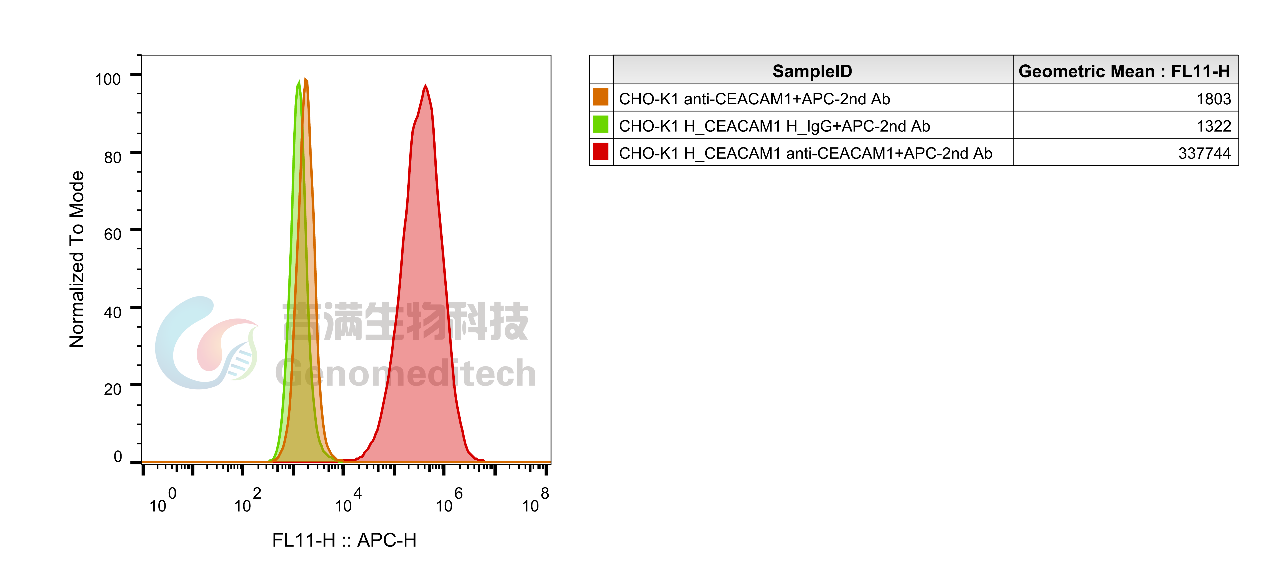Cat. No:GM-30164AB
Product:Anti-H_CEACAM1(CD66a) hIgG4 Antibody(MK-6018)
Cat. No:GM-30164AB
Product:Anti-H_CEACAM1(CD66a) hIgG4 Antibody(MK-6018)
GM-30164AB-10 10 μg
GM-30164AB-100 100 μg
GM-30164AB-1000 1mg
Species Reactivity Human
Specificity Besilesomab
Source/Isotype Monoclonal human IgG4, κ
Other Names BGP, BGP1, BGPI
Gene ID 634(human)
Application Flow cytometry: 0.5 μg-2 μg /test; FC-Quality tested
Background Carcinoembryonic antigen-related cell adhesion molecule 1 (CEACAM1) is a member of the CEA family of highly glycosylated cellular adhesion molecules, which belongs to the immunoglobulin superfamily. CEA proteins are built from a highly conserved modular set of N-terminal variable-like and constant-like immunoglobulin domains that mediate cis or trans homophilic or heterophilic adhesion. Amongst other members of the CEA family, human CEACAM1 gene undergoes the most extensive alternative splicing, giving rise to 12 splice variants. CEACAM1 is expressed on epithelia, endothelia and leukocytes, but is absent from skeletal muscle myocytes and cartilage. The protein is both structurally and functionally conserved in humans and rodents and shares the same tissue expression pattern.
Storage Store at +4℃ short term (1-2 weeks). Store at -20℃ long term
Formulation Phosphate-buffered solution, pH 7.2.

Cat. No:GM-30164AB
Product:Anti-H_CEACAM1(CD66a) hIgG4 Antibody(MK-6018)
GM-30164AB-10 10 μg
GM-30164AB-100 100 μg
GM-30164AB-1000 1mg
Species Reactivity Human
Specificity Besilesomab
Source/Isotype Monoclonal human IgG4, κ
Other Names BGP, BGP1, BGPI
Gene ID 634(human)
Application Flow cytometry: 0.5 μg-2 μg /test; FC-Quality tested
Background Carcinoembryonic antigen-related cell adhesion molecule 1 (CEACAM1) is a member of the CEA family of highly glycosylated cellular adhesion molecules, which belongs to the immunoglobulin superfamily. CEA proteins are built from a highly conserved modular set of N-terminal variable-like and constant-like immunoglobulin domains that mediate cis or trans homophilic or heterophilic adhesion. Amongst other members of the CEA family, human CEACAM1 gene undergoes the most extensive alternative splicing, giving rise to 12 splice variants. CEACAM1 is expressed on epithelia, endothelia and leukocytes, but is absent from skeletal muscle myocytes and cartilage. The protein is both structurally and functionally conserved in humans and rodents and shares the same tissue expression pattern.
Storage Store at +4℃ short term (1-2 weeks). Store at -20℃ long term
Formulation Phosphate-buffered solution, pH 7.2.
